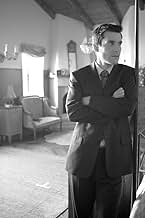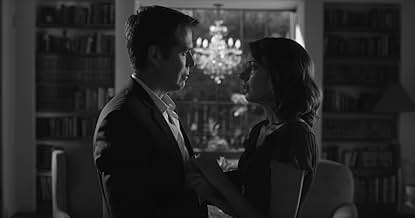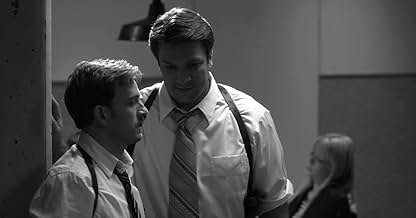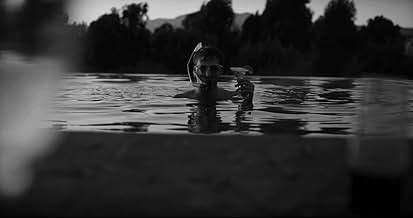NOTE IMDb
7,0/10
17 k
MA NOTE
Ajouter une intrigue dans votre langueA modern retelling of Shakespeare's classic comedy about two pairs of lovers with different takes on romance and a way with words.A modern retelling of Shakespeare's classic comedy about two pairs of lovers with different takes on romance and a way with words.A modern retelling of Shakespeare's classic comedy about two pairs of lovers with different takes on romance and a way with words.
- Réalisation
- Scénario
- Casting principal
- Récompenses
- 1 victoire et 8 nominations au total
Avis à la une
This is such a great adaptation. The actors speak their lines with clarity and emotion. The cinematography is great, and the movie is in turns very funny and tragic. A lot will be written about how Hero would never simply die because she was accused of 'not being a virgin', well she didn't. For once when I was watching it I got a sense of what was driving Claudio, his sense of betrayal and hurt. What he did was reprehensible but you could understand that he did have what he thought was good reasons. And for once I got a sense of real threat from Benedict's challenge. Amy Acker and Alexis Denisof made a delightful Beatrice and Benedict. You could feel the attraction there and you knew why Don Redro had such an easy time of it convincing his fellow conspirators to get them together.
What really impressed me about this film is how obvious it is that the cast is having a good time. The acting seems to be effortless and it is all spot on, and Clark Gregg/Nathan Fillion/Reed Diamond are hilariously funny. I think this is how Shakespeare should be done, as simply great entertainment. When you have that, you have the complexities laid out before you and like Claudio's anger you can see the reasons for the actions of the characters plainly.
'Much Ado About Nothing' has been very well served by Wheedon and his company of players, such a joy and that can be so rare in films nowadays.
What really impressed me about this film is how obvious it is that the cast is having a good time. The acting seems to be effortless and it is all spot on, and Clark Gregg/Nathan Fillion/Reed Diamond are hilariously funny. I think this is how Shakespeare should be done, as simply great entertainment. When you have that, you have the complexities laid out before you and like Claudio's anger you can see the reasons for the actions of the characters plainly.
'Much Ado About Nothing' has been very well served by Wheedon and his company of players, such a joy and that can be so rare in films nowadays.
I love this play, and have seen many versions. I was even in a production in New Jersey.
This is an unimpressive version of a great story, and the great moments come from the "writing"as the kids are saying nowadays. The leads may not be terrible actors, but they sure failed to move me here. Even Dogberry was pretty blah and that character can really uplift a failed production. Amongst an uninspiring cast, Don Pedro's character was the best of the bunch. I didn't mind listening to him at all. Even his moments with Claudio and Beatrice were bearable. The music was okay. There were some interesting staging choices, but that doesn't make this worth watching.
I really can't get behind this film, and would recommend going to the theatre, or renting the other film versions.
This is an unimpressive version of a great story, and the great moments come from the "writing"as the kids are saying nowadays. The leads may not be terrible actors, but they sure failed to move me here. Even Dogberry was pretty blah and that character can really uplift a failed production. Amongst an uninspiring cast, Don Pedro's character was the best of the bunch. I didn't mind listening to him at all. Even his moments with Claudio and Beatrice were bearable. The music was okay. There were some interesting staging choices, but that doesn't make this worth watching.
I really can't get behind this film, and would recommend going to the theatre, or renting the other film versions.
Greetings again from the darkness. The previous movie version of William Shakespeare's play Much Ado About Nothing was directed in 1993 by Kenneth Branagh, who also directed Thor (2011). This modernized, much simpler version is directed by Joss Whedon, who also directed The Avengers last year. It's difficult to imagine a more oddball movie symmetry than that! Whedon's production plays almost like a home movie, and in a way it is. Filmed at the director's Santa Monica house with a cast featuring mostly a close group of his friends ... those that frequently gather for Shakespeare dinner parties ... this one exudes a certain joy and love of the material from all involved.
I have always been more attracted to Shakespeare's comedies than his more famous tragedies. His startling wordsmithing is always filled with an edge and is borne of real personalities we all recognize. Combine that with director Whedon's love of rapid-fire, wise-cracking dialogue and we get something from the ilk of Preston Sturges or Howard Hawks screwball comedies.
The banter and battle of wits between Beatrice (Amy Acker) and Benedick (Alexis Denisof) are at the heart of the story. Their flirtations are recognizable as two who doth protest too much ... as if it could hide their mutual attraction. In one of the most pure comedic roles from the pen of Shakespeare comes Dogberry, the detective on the case of the dark conspiracy occurring right under the noses of most characters. Nathan Fillion ("Castle") plays Dogberry in such a manner that he steals every scene in which he appears ... both verbally and physically. He provides some laugh out loud moments.
You will recognize some of the others in Whedon's acting troupe: Reed Diamond plays Don Pedro, Clark Gregg as Leonato, and Fran Kranz as Claudio. Newcomer Jillian Morgese plays Hero, the wronged bride-to-be, whose misfortunes lead to the great Dogberry scenes.
The temptation here is to say that a very entertaining movie can be made simply, cheaply and quickly (12 days filming). Of course, as wonderful as Amy Acker is, the real star is the story from William Shakespeare ... even in this modernized setting. As we all know, "A rose by any other name would smell as sweet". Whedon and his cronies prove this.
I have always been more attracted to Shakespeare's comedies than his more famous tragedies. His startling wordsmithing is always filled with an edge and is borne of real personalities we all recognize. Combine that with director Whedon's love of rapid-fire, wise-cracking dialogue and we get something from the ilk of Preston Sturges or Howard Hawks screwball comedies.
The banter and battle of wits between Beatrice (Amy Acker) and Benedick (Alexis Denisof) are at the heart of the story. Their flirtations are recognizable as two who doth protest too much ... as if it could hide their mutual attraction. In one of the most pure comedic roles from the pen of Shakespeare comes Dogberry, the detective on the case of the dark conspiracy occurring right under the noses of most characters. Nathan Fillion ("Castle") plays Dogberry in such a manner that he steals every scene in which he appears ... both verbally and physically. He provides some laugh out loud moments.
You will recognize some of the others in Whedon's acting troupe: Reed Diamond plays Don Pedro, Clark Gregg as Leonato, and Fran Kranz as Claudio. Newcomer Jillian Morgese plays Hero, the wronged bride-to-be, whose misfortunes lead to the great Dogberry scenes.
The temptation here is to say that a very entertaining movie can be made simply, cheaply and quickly (12 days filming). Of course, as wonderful as Amy Acker is, the real star is the story from William Shakespeare ... even in this modernized setting. As we all know, "A rose by any other name would smell as sweet". Whedon and his cronies prove this.
I was pleasantly surprised to discover this movie on Hulu a few night ago, and since Much Ado About Nothing is one of my favorite Shakespeare plays, I was eager to dive in.
For the most part, it doesn't disappoint. Whedon, as usual, has a good eye for mood and for how dialog impacts action. The visual of the "mourners" coming down the hillside with candles was in itself an amazing feat of cinematography and setting, for example. The acting was superb as well, and in general this modern translation of the play captures its essence and impact.
Some specifics for me:
1) The actress playing Beatrice -- amazing job. Hate to say this, but I think she may have done a better job of interpreting the role than Emma Thompson in many ways. Very believable incarnation, and this helped to make the humor of her biting wit more comprehensible.
2) The backstory -- Not that every little piece has to be specifically addressed, but I didn't quite get what Don Pedro was the "prince" of. Not sure if he and his "soldiers" were Mafia, or actual royalty, or what, but that lack of clarity seemed to hurt the credibility a bit.
3) The actor playing Benedick -- I've seen him before in other things, and he's generally good, but I don't think this was the role for him. As much as Beatrice sold her role to the audience, Benedick did not, especially in the dramatic scenes. He was okay in the purely comedic scenes, granted, but for me and others, his lack of "presence" hurt the relationship between him and Beatrice. Benedick is a difficult role, and perhaps another Whedon associate could have done it more justice. Tudyk, perhaps? Or put Fillion there instead of Dogberry?
4) General interpretation -- Lots of little things throughout to really help make the action and the words clear, or perhaps to put a little different twist to things. When Claudio sees Hero faint, for example, he instinctively starts to go to her but is restrained by Pedro; nice touch. The music is fun, and I'm going now to find this version of "Hey, Nonny, Nonny." Not quite sure why black and white was chosen, but no complaints; it adds some "classiness" to this movie. Acting in general was good -- Don John, Don Pedro, Leonato, Claudio, Ursula -- nearly everyone gave Branaugh's version a run for its money.
5) Diversity -- Not sure why this was so very, very white. I think there is a danger in diversity for diversity's sake, but no major roles in other ethnicities at all?
6) Dogberry -- It's going to be difficult for anyone to top Michael Keaton's take on Dogberry, but Nathan Fillion does a pretty good job here. I think one weakness is that somone (Whedon?) decided that Dogberry ought to have some credibility, so Fillion had to navigate tricky waters with the character. Not sure it completely worked, but Fillion did what he could with what he was given.
All in all, a fun rendition of a great play. I enjoyed the risks Whedon took, and the overall feeling of "a party gone wrong and then put right again."
For the most part, it doesn't disappoint. Whedon, as usual, has a good eye for mood and for how dialog impacts action. The visual of the "mourners" coming down the hillside with candles was in itself an amazing feat of cinematography and setting, for example. The acting was superb as well, and in general this modern translation of the play captures its essence and impact.
Some specifics for me:
1) The actress playing Beatrice -- amazing job. Hate to say this, but I think she may have done a better job of interpreting the role than Emma Thompson in many ways. Very believable incarnation, and this helped to make the humor of her biting wit more comprehensible.
2) The backstory -- Not that every little piece has to be specifically addressed, but I didn't quite get what Don Pedro was the "prince" of. Not sure if he and his "soldiers" were Mafia, or actual royalty, or what, but that lack of clarity seemed to hurt the credibility a bit.
3) The actor playing Benedick -- I've seen him before in other things, and he's generally good, but I don't think this was the role for him. As much as Beatrice sold her role to the audience, Benedick did not, especially in the dramatic scenes. He was okay in the purely comedic scenes, granted, but for me and others, his lack of "presence" hurt the relationship between him and Beatrice. Benedick is a difficult role, and perhaps another Whedon associate could have done it more justice. Tudyk, perhaps? Or put Fillion there instead of Dogberry?
4) General interpretation -- Lots of little things throughout to really help make the action and the words clear, or perhaps to put a little different twist to things. When Claudio sees Hero faint, for example, he instinctively starts to go to her but is restrained by Pedro; nice touch. The music is fun, and I'm going now to find this version of "Hey, Nonny, Nonny." Not quite sure why black and white was chosen, but no complaints; it adds some "classiness" to this movie. Acting in general was good -- Don John, Don Pedro, Leonato, Claudio, Ursula -- nearly everyone gave Branaugh's version a run for its money.
5) Diversity -- Not sure why this was so very, very white. I think there is a danger in diversity for diversity's sake, but no major roles in other ethnicities at all?
6) Dogberry -- It's going to be difficult for anyone to top Michael Keaton's take on Dogberry, but Nathan Fillion does a pretty good job here. I think one weakness is that somone (Whedon?) decided that Dogberry ought to have some credibility, so Fillion had to navigate tricky waters with the character. Not sure it completely worked, but Fillion did what he could with what he was given.
All in all, a fun rendition of a great play. I enjoyed the risks Whedon took, and the overall feeling of "a party gone wrong and then put right again."
Much Ado About Nothing by Joss Whedon is the latest adaptation of the Shakespeare's comedy.
The good. Excellent ideas. Very funny settings and actions. Nice choice of actors. With visual, it's always possible to add non spoken actions to original dialogs and Whedon made some clever extensions. Great photography.
The actors. My favorite performance were by Nathan Fillion, Sean Maher, and Tom Lenk, although I came to appreciate those of Amy Acker and Alexis Denisof a lot.
The bad. The concept of war as spoken in the piece doesn't translate well in modern time.
The ugly. Nothing.
The result. Solid entertainment for those who like modern transposition of Shakespeare's work, A must for any Whedon fan.
The good. Excellent ideas. Very funny settings and actions. Nice choice of actors. With visual, it's always possible to add non spoken actions to original dialogs and Whedon made some clever extensions. Great photography.
The actors. My favorite performance were by Nathan Fillion, Sean Maher, and Tom Lenk, although I came to appreciate those of Amy Acker and Alexis Denisof a lot.
The bad. The concept of war as spoken in the piece doesn't translate well in modern time.
The ugly. Nothing.
The result. Solid entertainment for those who like modern transposition of Shakespeare's work, A must for any Whedon fan.
Le saviez-vous
- AnecdotesThis movie was filmed at Joss Whedon's Santa Monica home, which was designed and decorated by Whedon's wife Kai Cole. Cole suggested Whedon make it in lieu of going on vacation for their 20th anniversary because it had long been his passion project.
- GaffesIt is Ursula & Hero whom are 'meddling' (talking about Benedick's love for Beatrice as she eavesdrops). In the following scene, Claudio relays to Don Pedro that it was Margaret & Hero that were meddling.
- ConnexionsFeatured in At the Movies: Épisode #10.21 (2013)
- Bandes originalesSigh No More
Lyrics by William Shakespeare
Music by Joss Whedon
Performed by Jed Whedon & Maurissa Tancharoen
Meilleurs choix
Connectez-vous pour évaluer et suivre la liste de favoris afin de recevoir des recommandations personnalisées
Détails
Box-office
- Montant brut aux États-Unis et au Canada
- 4 328 849 $US
- Week-end de sortie aux États-Unis et au Canada
- 171 942 $US
- 9 juin 2013
- Montant brut mondial
- 5 341 221 $US
- Durée1 heure 49 minutes
- Couleur
- Rapport de forme
- 1.85 : 1
Contribuer à cette page
Suggérer une modification ou ajouter du contenu manquant

Lacune principale
By what name was Beaucoup de bruit pour rien (2012) officially released in India in English?
Répondre






































